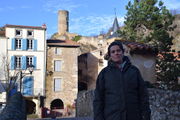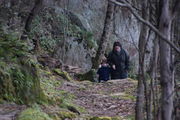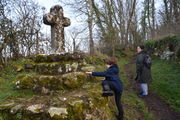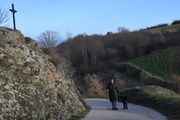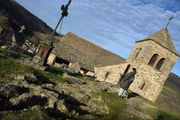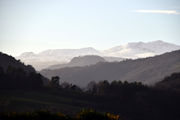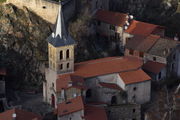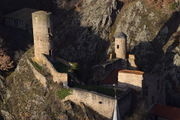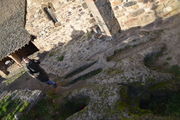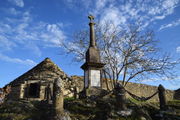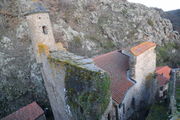m (→Saint Floret) |
m |
||
| Line 7: | Line 7: | ||
The river, ''la Couze Pavin'', originates from the [[Lac Pavin]] . ''Couze'' means surging river ({{fr}} rivière torrentueuse) and this is indeed the case of this one, which makes a deafening noise and, although a small river, flows at great if not scary speed. It goes through [[Issoire]] before going into the [[Allier]]. The bridge hosts a [[virgin]], as is the case also in [[Saurier]], to protect it as per medieval customs. This one, Notre-Dame du Pont, is a XIIIth century polychrome, possibly a black virgin. | The river, ''la Couze Pavin'', originates from the [[Lac Pavin]] . ''Couze'' means surging river ({{fr}} rivière torrentueuse) and this is indeed the case of this one, which makes a deafening noise and, although a small river, flows at great if not scary speed. It goes through [[Issoire]] before going into the [[Allier]]. The bridge hosts a [[virgin]], as is the case also in [[Saurier]], to protect it as per medieval customs. This one, Notre-Dame du Pont, is a XIIIth century polychrome, possibly a black virgin. | ||
| − | The most iconic feature of Saint Floret is certainly its Donjon, built in the XIIIth century by the Dauphin d'Auvergne, who was cast away there following a family row, on this territory of "Puys and Couzes", where he, to pass time, built various donjons and fortresses. | + | The most iconic feature of Saint Floret is certainly its Donjon, built in the XIIIth century by the Dauphin d'Auvergne, who was cast away there following a family row, on this territory of "Puys and Couzes", where he, to pass time, built various donjons and fortresses. Its circular shape, of the "Philippéen" type, is archetypical in [[Auvergne]] (see [[Montpeyroux]], [[Champeix]], [[Grandeyrolles]], [[Vodable]], [[Chalus]], [[Tournoël]], [[Léotoing]], [[La Sauvetat]]). |
| − | <center><wz tip="">[[File:Campercita-25December2019-18.jpg|300px]]</wz></center> | + | <center><wz tip="The Donjon of Saint Floret, a symbol of the place, if not of Puy-de-Dôme altogether.">[[File:Campercita-25December2019-18.jpg|300px]]</wz></center> |
There is in the "Tour Logis" at the foot of the rock an important room with murals that provide the only known XIVth representation of the Tristan and Yseult story, but unfortunately we could not visit it (closed). Also of importance is the romance church overlooking the village, l'Église du Chastel, with a medieval cemetery. We were shocked to find that an ossuary is open to everybody's sight. | There is in the "Tour Logis" at the foot of the rock an important room with murals that provide the only known XIVth representation of the Tristan and Yseult story, but unfortunately we could not visit it (closed). Also of importance is the romance church overlooking the village, l'Église du Chastel, with a medieval cemetery. We were shocked to find that an ossuary is open to everybody's sight. | ||
Revision as of 19:03, 9 January 2020
Saint Floret
Saint Floret is a commune of Puy-de-Dôme, which we visited on 25 December (2019).
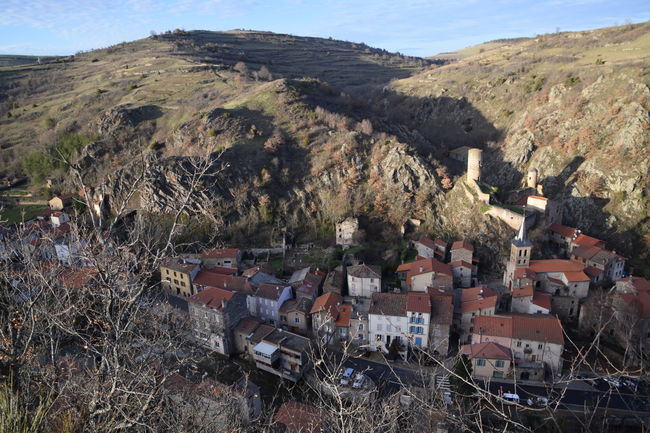
The river, la Couze Pavin, originates from the Lac Pavin . Couze means surging river (![]() rivière torrentueuse) and this is indeed the case of this one, which makes a deafening noise and, although a small river, flows at great if not scary speed. It goes through Issoire before going into the Allier. The bridge hosts a virgin, as is the case also in Saurier, to protect it as per medieval customs. This one, Notre-Dame du Pont, is a XIIIth century polychrome, possibly a black virgin.
rivière torrentueuse) and this is indeed the case of this one, which makes a deafening noise and, although a small river, flows at great if not scary speed. It goes through Issoire before going into the Allier. The bridge hosts a virgin, as is the case also in Saurier, to protect it as per medieval customs. This one, Notre-Dame du Pont, is a XIIIth century polychrome, possibly a black virgin.
The most iconic feature of Saint Floret is certainly its Donjon, built in the XIIIth century by the Dauphin d'Auvergne, who was cast away there following a family row, on this territory of "Puys and Couzes", where he, to pass time, built various donjons and fortresses. Its circular shape, of the "Philippéen" type, is archetypical in Auvergne (see Montpeyroux, Champeix, Grandeyrolles, Vodable, Chalus, Tournoël, Léotoing, La Sauvetat).
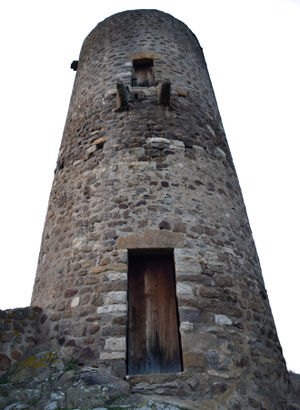
There is in the "Tour Logis" at the foot of the rock an important room with murals that provide the only known XIVth representation of the Tristan and Yseult story, but unfortunately we could not visit it (closed). Also of importance is the romance church overlooking the village, l'Église du Chastel, with a medieval cemetery. We were shocked to find that an ossuary is open to everybody's sight.
